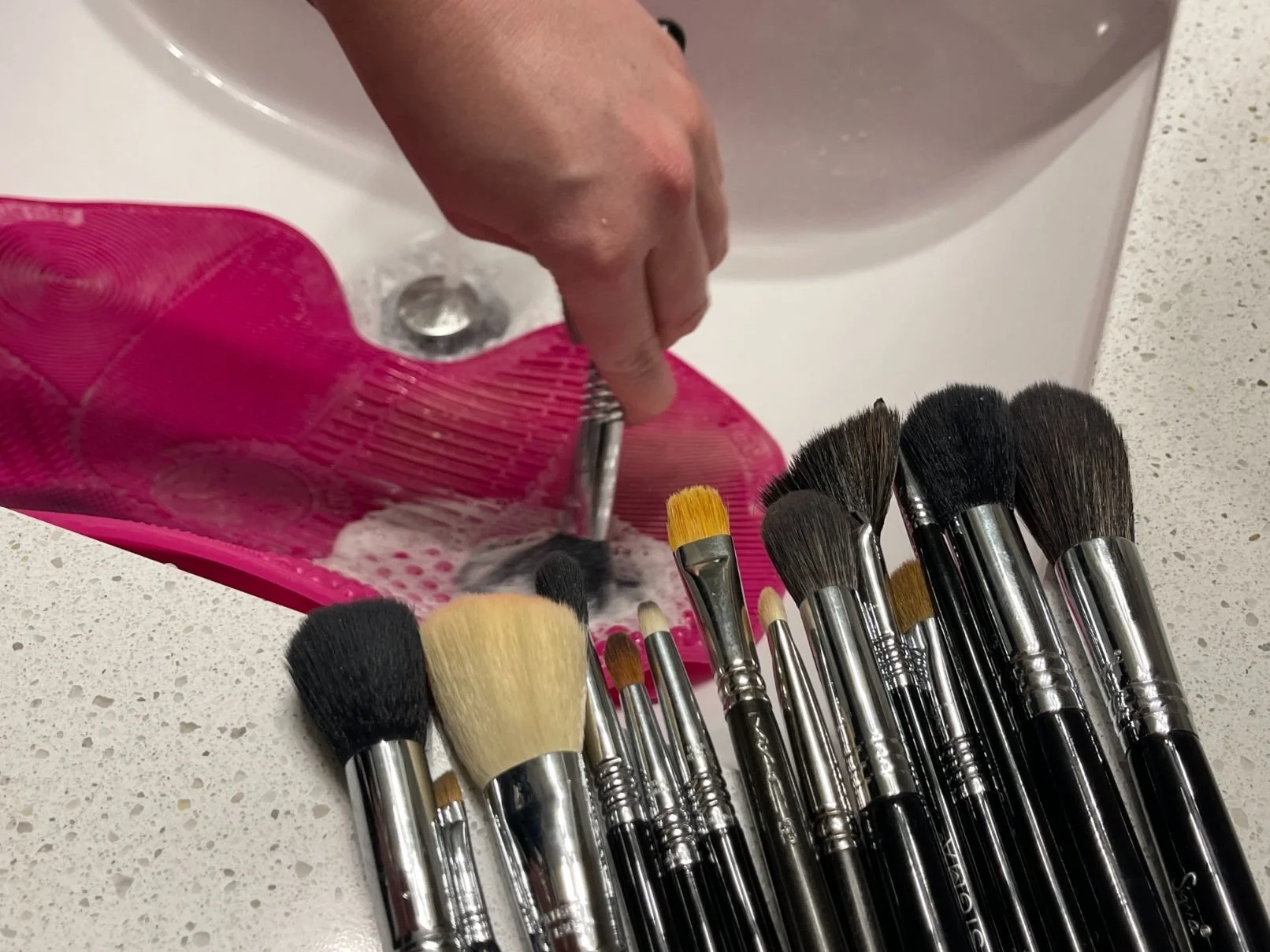How To Clean Your Makeup Brushes And When To Do It
How and When To Clean Your Makeup Brushes
Pro tips for making your makeup brushes last as well as keeping yourself and your clients healthy
If we had to make a list of all the things that we wish got magically done all on their own and on a regular basis it might include things like working out, flossing our teeth, walking the dog, cleaning the bathroom, and yes, cleaning your makeup brushes. Whether you are a professional artist or a regular consumer, washing your makeup brushes should be second nature, much like drinking 8 glasses of water per day or calling your family on the weekend. An engrained behavior that one does for self-care and normalcy in life. Unfortunately, however, this isn’t the case. Washing makeup brushes in fact is an after-thought at best for most women. And sadly, in the professional realm of artistry, it often goes overlooked as well.
Jessica Mae washing her Sigma Beauty Makeup Brushes
With each brushstroke you make, your brushes collect bacteria, grime, oil, and even dust. The next time you use them they will be less effective at what they are designed to do. They will also be a potential breeding ground for disease and acne. The longer you go without sanitizing your tools, the more bacteria and fungi can build up and lead to conditions like acne, pink eye, and even staph infections. Then there's the matter of technique. If you don't wash your brushes correctly, you risk shedding or damaging the fibers on your face to someone else’s.
“Vinegar is a multi-purpose cleanser, too harsh and drying for the care of your makeup brushes. Dry brush fibers won’t apply makeup flawlessly.”
So, before you freak out and rush to the store to get yourself a new and clean set of brushes, you should know that cleaning makeup tools isn’t the daunting chore that you might assume it to be. In fact, it’s as easy as soaking, dabbing, and air-drying.
Ready to learn how to quickly clean your makeup brushes and get back to achieving that flawless, natural makeup look? Keep scrolling to find out more.
Things you’ll need to clean your makeup brushes
Luckily, cleaning your makeup brushes is quick and easy. The first step to keeping your brushes clean is picking up a daily brush cleaner and spritzing it on your brushes after each use. There are several on the market, just check your favorite brands.
Once a week, it’s time for deep cleaning. (Note that your brushes will need a few hours to dry after a deep cleaning, so you’ll want to do this after you’ve applied your makeup that day.) If you are a Professional Makeup Artist, not only will you want to do this after every use, you’ll want to clean your brushes after every client. This is not realistic in most cases, so having several sets of makeup brushes for professional use is my best advice.
Pick the right cleanser
The first step in brush cleaning is to choose the right cleanser. Whether you’re using natural or synthetic bristle brushes, those bristles are delicate, and just like your own hair, they can start to break down and fray if they’re treated too harshly.
Because they’re constantly using their brushes, professional makeup artists often opt for rinse-free formulas. You can find these from brands like Make-Up For Ever Instant Brush Cleanser, or Cinema Secrets Makeup Brush Cleaner. If you don’t have the patience to wait on wet brushes for hours—these instant-dry formulas, which use oil derivatives to break up sebum and makeup residue, may be exactly what you need. Just make sure to educate yourself on the ingredients list: some formulas add in alcohol to ward-off bacteria and speed up the dry time. These will come with the usual problems that alcohol-based products often serve up, which are being moisture-starved, split prone, and a shortened life.
Sigma Beauty Brush Shampoo Foam
I like to use Sigma Beauty Brush Shampoo Foam. It’s an all-natural, ready-to-use, brush cleaning solution that outperforms sprays. It’s also pretty affordable at $19/bottle. If you’re a pro, you probably get it at a lower cost.
Be gentle with your makeup brushes
No matter what type of formula you choose, your technique will be key. To prevent fraying, work your cleanser into your brush in the same direction as the bristles, swirling lightly (you don't need much pressure) into the palm of your hand or over a textured cleansing mat, Scrubbing brushes against the grain can open the cuticles of natural bristles and break off synthetic ones, both of which will leave you with scraggly makeup brushes that don’t work very well. If you’ve ever painted a wall in your home and applied too much pressure while painting, you quickly find bristles dis-lodging from the brush. The same concept applies here and also to brushing your teeth! Slow and gentle wins this particular race.
For a cleaning mat, I personally like Sigma Beauty Spa Brush Cleaning Mat. The Sigma Beauty Spa Brush Mat is silicone with 7 different textures areas for assisting in properly and efficiently washing your brushes.
The ‘right way’ to clean makeup brushes
Clean, good-as-new makeup brushes and sponges are just a few steps away:
Wet the bristles with lukewarm water - certainly not cold and you don’t need hot.
Place a drop of your cleanser of choice into the palm of your clean hand or in the case of Sigma Beauty’s foam - on the brush head.
Gently massage the tips of the bristles in your palm.
Rinse the bristles thoroughly.
Squeeze out the excess moisture with a clean towel.
Re-form the brush head back into its original shape.
Let the brush dry with its bristles hanging off the edge of a counter, which allows it to dry in the correct shape. Never let your brushes dry on a towel unless you intend to turn them often until dry to prevent mildew.
When is it time to throw away your makeup brushes?
Although cleaning frequently and properly can help extend the life of your brushes, there are signs you shouldn't ignore when it comes to determining that they're no longer capable of doing the best job possible. When the bristles start to bend, fray, or lose their shape, then it’s time to go. If your brush become deformed or squashed, they won’t be effective tools in creating the looks you’re after or completing your job.
Don’t believe cleansing myths
If you spend time on Pinterest reading about makeup brushes, you’ll find people positioning some truth in home remedies such as vinegar soaks. Allure magazine interviewed our very own Laura Barnes, a former Sigma Beauty representative, and she said “Vinegar is a multi-purpose cleanser, too harsh and drying for the care of your makeup brushes. Dry brush fibers won’t apply makeup flawlessly.”






